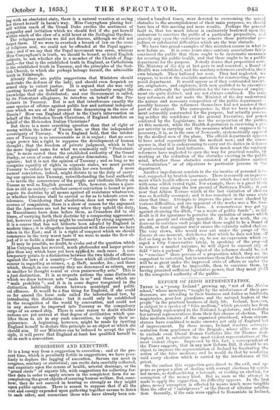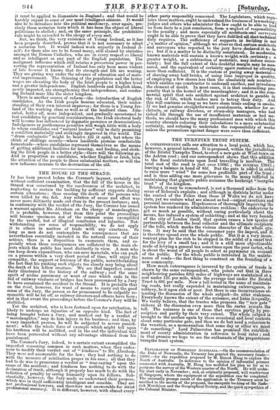REFORM OF IRISH REPRESENTATION.
THERE is a "young Ireland" growing up, "not of the Nation school," whose members, "taught by the misfortunes of their pre- decessors, are attending to their business and duties as landlords, magistrates, poor-law guardians, and the natural leaders of the people" in the practical business of daily life. Ireland, however, is subject to a species of "false medium," which prevents her from being fairly represented in the National Legislature, and exoludes her natural representatives from their fair chance of election. The false medium consists of the organized priesthood, whom circum- stances have combined to make enemies not only of England but of improvement. By these means, Ireland receives 2nisrepre- sentation from gentlemen of the Brigade ; whose allies are able to exclude even liberal Roman Catholics like Sir Thomas Red- ington, and to substitute the most violent representatives of the most violent clique. Impressed by this fact, a correspondent of the Times suggests, that in any new Reform Bill, it should be an object to improve the representation of Ireland by frustrating the action of the false medium ; and he would do that by rendering void every election which is carried by the interference of the priest. On the surface this suggestion goes direct to the evil, and ap- pears as proper a plan of dealing with corrupt elections by spirit- ual means, as disfranchising a borough, or voiding an election, for corruption of the money kind. But as soon as the attempt is made to apply the suggestion, its difficulty appears. In the first place, money corruption is effected by means much more tangible than the offer of " indulgences " or the threat of ulterior retribu- tion. Secondly, if the rule were applied to Romanists in Ireland, it must be applied to Romanista in England ; and that would be harshly unjust to some of our most intelligent citizens. It would also be to introduce into the polities' machinery, over again, pre- cisely those sectarian tests which it has been the object of liberal politicians to abolish ; and, on the same principle, the prohibitive rule might be extended to the clergy of every sect. But, we think, the very existence of Young Ireland, as it has been properly described, proves that, it is not necessary to adopt a sectarian test. It would indeed work unjustly in Ireland it- self; for there also are to be found many, still classed by statistics i amongst the Roman Catholics, who are n every respect as liberal and as intelligent as any part of the English population. The malignant influence which still retains a precarious power in per- verting the representation of Ireland has only been more violent of late because it knows that its strength and life are waning. They are giving way under the advance of education and of mate- rial improvement. The thinning of the population and the better wages are elevating the body of the Irish people to a higher level and a greater independence. English landlords and English ideas, newly imported, are strengthening that independence, and render- ing Ireland more like the sister kingdom.
There is another source of reform—the introduction of English candidates. As the Irish people become educated, their under- standing of their own interest improves ; for there is a Young Ire- land of the working class as well as of the landlord class. Edu- cated, better off, more independent, and-gradually accustomed to test candidates by practical considerations, the Irish electoral body will become less influenced by dogmatic promises or denunciations. Indulgences or posthumous penalties will weigh little with a body to whom candidates and "natural leaders" will be daily promising a condition materially and strikingly impsoved in this world. The "drum ecclesiastic" might be beaten till it split, but where the chink of shillings sounds—where landlords promise comfortable homesteads—where candidates represent themselves as the means of getting additional facilities for housing) and feeding, and cloth- ing the Irish people in a better style—there will the following go. And in proportion as candidates, ,whether English or Irish, turn the attention of the people to these substantial matters, so will the new influence increase to the destruction of the old.



























 Previous page
Previous page